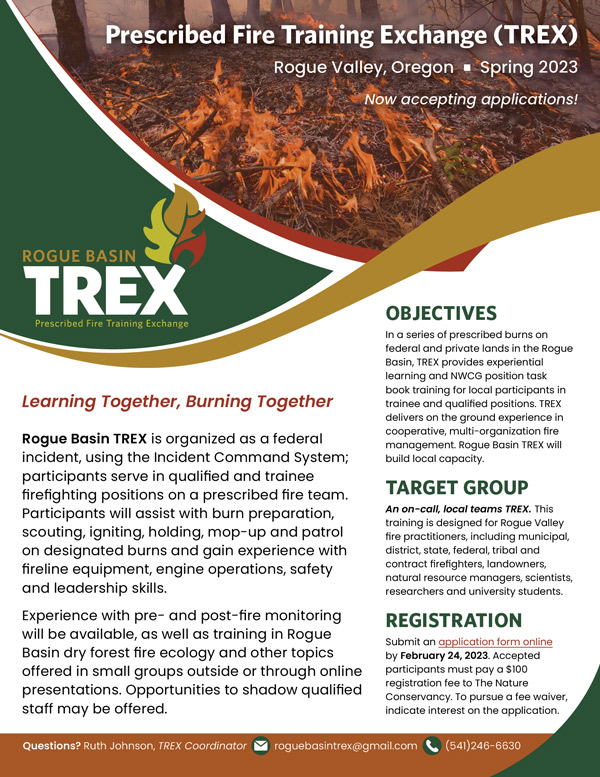2023 Rogue Basin TREX now accepting applications
Rogue Basin Prescribed Fire Training Exchange (RBTREX) is organized as a federal incident using the Incident Command System; participants serve in qualified and trainee firefighting positions on a prescribed fire team. Participants will assist with burn preparation, scouting, igniting, holding, mop-up, and patrol on designated burns and gain experience with fireline equipment, engine operations, safety, and leadership skills.
Experience with pre- and post-fire monitoring will be available, as well as training in Rogue Basin dry forest fire ecology and other topics offered in small groups outside or through online presentations. Opportunities to shadow qualified staff may be offered.
Objectives
In a series of prescribed burns on federal and private lands in the Rogue Basin, TREX provides experiential learning and NWCG position task book training for local participants in trainee and qualified positions. TREX delivers on-the-ground experience in cooperative, multi-organization fire management. Rogue Basin TREX will build local capacity.
Target Group
An on-call, local teams TREX. This training is designed for Rogue Valley fire practitioners, including municipal, district, state, federal, tribal, and contract firefighters, landowners, natural resource managers, scientists, researchers, and university students.
Registration
Submit an application form online by February 24, 2023. Accepted participants must pay a $100 registration fee to The Nature Conservancy. To pursue a fee waiver, indicate interest on the application.
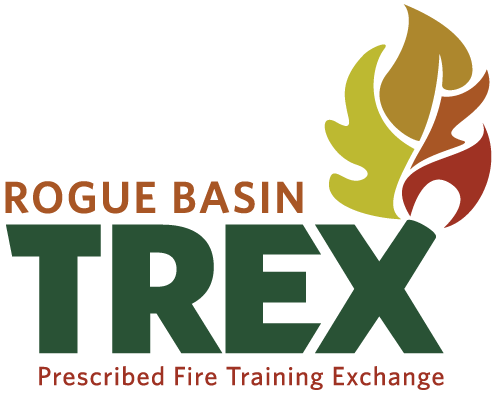
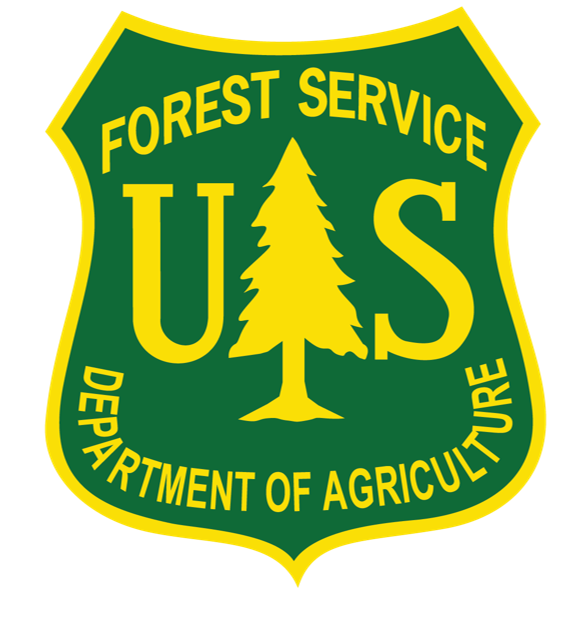
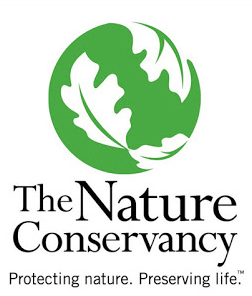
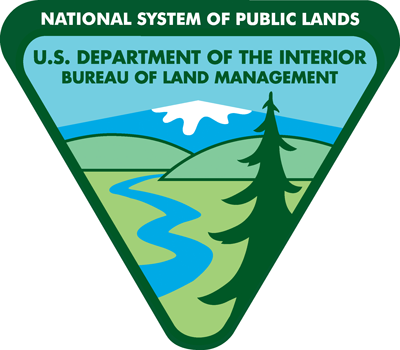
Participant Requirements
- Participants must be currently qualified as a type two firefighter or have completed NWCG courses ICS-100, L-180, S-130, S-190 and FEMA IS-700a. Courses are available online for participants who need them, and opportunities for a “field day” and orientation is planned by coordinating partners, date likely Saturday, March 4th. Documentation of the above courses and an annual fire refresher (RT-130) will be required for TREX participants.
- Participants must complete and have certified documentation of an arduous pack test. Accommodation may be made on a case and conditional basis if a participant requests. TREX will offer a pack test if there is a demonstrated need amongst participants. Contact coordinator for specifics.
- Participants must have insurance (e.g., workers’ comp, health or travel insurance) to cover any injury they receive during the event, and sign a TNC liability waiver.
- Participants must have their own reliable transportation, or may carpool if following Covid safety protocol TBD.
- Personal Protective Equipment (PPE): Participants must bring fireline-approved boots (boots must be leather lace up style, minimum of 8 inches tall, lug style melt-resistant sole, and no steel toe). Participants should come with all PPE including: next generation fire shelter, hard hat, Nomex clothing, all leather gloves, eye protection and canteens for drinking water. If you do not have all the PPE please indicate on the application, and these can be provided by coordinating partners.
- On-Call commitment: Participants will serve and participate “on-call”. Participants will be notified within five days prior to a probable burn window, and further coordination the day prior. Applicants should declare periods of non-availability over the TREX season. Teams will be based on geography, equipment, skills, training needs, and availability. Opportunities are possible for one day or multiple days depending on conditions.
Rogue Basin TREX is funded by the Fire Learning Network and hosted by the Rogue River Siskiyou National Forest, the Oregon State University Fire Program, the Rogue Valley Prescribed Burn Association, The Nature Conservancy, and others. The Fire Learning Network is supported by Promoting Ecosystem Resilience and Fire Adapted Communities Together, a cooperative agreement between The Nature Conservancy, USDA Forest Service and agencies of the Department of the Interior. These institutions are equal opportunity providers.

